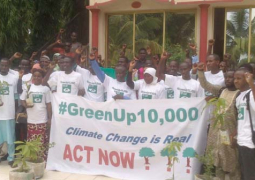The CountrySTAT, a web-based information technology system that allows gathering and monitoring of national and sub-regional food and agricultural data in compliance with international standards, was officially launched on Monday at the Paradise Suites Hotel in Kololi.
Organised by the Ministry of Agriculture in collaboration with partners such as the United Nations Food and Agriculture Organisation (FAO), United Nations Development Programme (UNDP) and World Food Programme (WFP), officials believe the implementation of this system will also help to strengthen the collaboration between statistical institutions in the country.
It is expected to create opportunity for the policymakers, government machinery, development partners and other participants to be acquainted with the system and to learn how it can be used to improve data quality and to support the policymaking process.
Speaking on behalf of agriculture department, Musa Humma, director of agriculture, said the Government of The Gambia is committed to food security with good policies, projects and programmes that are geared towards ensuring food security for the citizenry.
“The CountrySTAT is one of such projects that could contribute in ensuring realistic monitoring of food security status of countries as the platform that would not only promote partnership between different statistical agencies, but will contribute in improving data qualities and comparability based on international standards,” he remarked.
He challenged all the institutions that provide data to ensure that this modern information system is owned and sustained long into the future.
Assistant FAO representative Mariatou Faal-Njie said FAO attaches great importance to statistical information and to the capacity building of member nations in this domain.
The CountrySTAT is designed as unique window of information on food and agriculture, she said, adding that it is easily accessible on the web with statistical data of good quality that aid decision-makers in better evidence-based policymaking and greater efficiency development policies.
“Through national and regional CountrySTAT projects, FAO forms partnerships with statistical offices and the Ministries of Agriculture, Fisheries and Forestry among others to introduce the system and build the national capacity to use it,” she noted.
The WFP country representative, Victoria Ginjer, who spoke on behalf of the UN system in the country, told the gathering that food security crises have made them realize the need to improve food security monitoring, by collecting quality and timely data in analyzing it and disseminating findings.
She said that agriculture, being the mainstay of the economy, contributing over 25% to the country’s GDP and serving as source of livelihood for 70% of the population, deserves strengthening particularly in planning and statistical capacities.
“Agriculture in The Gambia is the only sure main route to ensuring sustainable food security and poverty reduction,” she added.
Ginjer commended the Government of The Gambia for its commitment and determination to introducing a centralised web-based information technology system.
She assured of the UN system’s unflinching support and readiness to continue supporting statistics and planning capacities in the country.
Ousman Jammeh, regional agricultural director for West Coast Region, stated that the countrySTAT will provide decision-makers access to statistics across thematic areas such as production, prices, trade and consumption.
This supports analysis, informed policy-making, and monitoring with the goal of eradicating extreme poverty and hunger.


